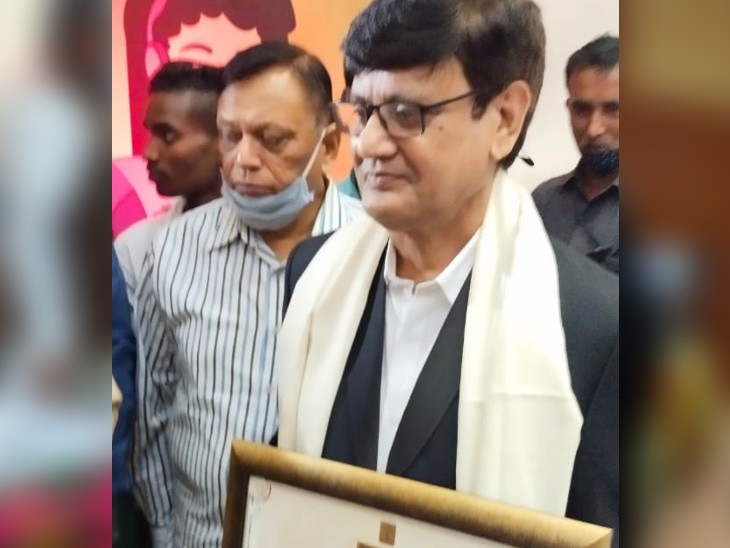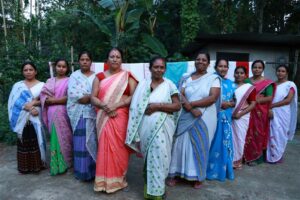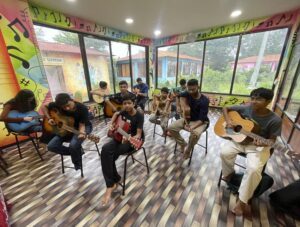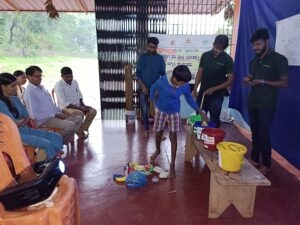Within Bihar, 40.8 percent of women, representing four out of every 10, enter into marriage before reaching the legally mandated age of 18. Among the 38 districts in the state, 12 districts surpass the average prevalence of child marriage. Notably, Seema’s hometown of Jamui is one such district, along with Supaul, Purnia, Saharsa, and Begusarai.
Child marriage is closely associated with abject poverty and young girls are often forced to get married in the absence of education and awareness. But that day, Seema was able to break out of this cycle. “I told my father that I wanted to become an ANM (Auxiliary Nurse Midwife). Fortunately, he decided to support me, and my marriage talks stopped,” says the 22-year-old, a second-year student at RB Chandra Para Medical Nursing College, Jamui
“If I hadn’t spoken up, I would have been forced into marriage like many other village girls. They marry young, become mothers early, and suffer health issues as they grow weaker. Today I feel empowered; all this was possible because of the efforts of Doctor Sir. It was due to his guidance that I was motivated to study,” she says.
For the past two decades, Dr Shankar Nath Jha, a paediatrician by profession, has volunteered to help children like Seema to use education as a tool for empowerment. Like Seema, he has helped 407 children from the Musahar community in the district to break the shackles of child marriage and labour.
Because of his efforts, today, Seema is able to afford her college fee of Rs 1.5 lakh and is also teaching around 30 children from her community in a village chaupal.
Socially marginalised, the Musahar community is located at the bottom of India’s caste system. Musahar in Bhojpuri literally means “rat eaters”. They were often compelled to subsist on a diet of rodents. Although their main former occupation was to catch rats, they now mostly work as agricultural and brick kiln labourers.
Dr Jha, who has been in the medical service for the past 40 years, would often get patients from Musahar community in his clinic. Explaining their socioeconomic status he says, “Their children are malnourished. Even if their children die, they would not shed tears [because the death rate was high and they were often emotionally drained]. I would see skinny young girls with children in their arms. It would be very heart-wrenching to see that,” the 70-year-old tells The Better India.
“I would often wonder that if they get graduated or at least learn to read and write, their lives could get better. But there is low awareness in the community. They live in unhygienic conditions and are involved in child labour. Let alone girls, we would not find even boys who had passed Class 10. I wanted to work for these children,” he says.
According to The Musahar: A Socio-Economic Study by Patna’s AN Sinha Institute of Social Studies supported by the National Human Rights Commission, education among the members of the community was almost non-existent, the literacy rate is only six percent. “ Development programmes of the Government had not reached them,” notes the study.
In a bid to help these children, Dr Jha started visiting the shanties of the Musahar community living in the Dalit localities of the district. He decided to teach the children but found that it was difficult to stay at the place post-afternoon.
Along with a non-profit Samagra Sewa Sansthan’s founder Makeshwar, Dr Jha started using some part of his income and spared some time off to visit the community. Gradually, he hired some teachers out of his own pocket to teach the children and engaged them in sports, dance, and debate programmes.
“We focussed on cleanliness, education, and employment. We started getting donations from individuals and my peers to distribute food materials, clothes, books, etc. Seeing this, more and more children got motivated and started joining the classes. These were all small steps, but the result was big,” says Dr Jha, who is also a senior advisor of the non-profit.
Today, nearly 5,000 children are associated with 85 centres [called Community Culture Education Centre] where 82 volunteers teach the children basic education so that they can be on par with their peers in schools. Since 2007 when the initiative started, as many as 5,000 children have been enrolled in schools. Currently, about 3,000 children are studying in the centres across Jamui.
For his work, Dr Jha was awarded the Maulana Abul Kalam Azad Shiksha Puruskar, Bihar’s highest award in the field of education, by Chief Minister Nitish Kumar in 2021.
“I have grown up playing with children irrespective of their caste or community. My parents have always taught me how to live harmoniously with all communities. It feels satisfying to do something for this [Musahar] community although I never thought this would have such a big impact. With the award, I got more recognition and support from peers, even from foreign countries. I will continue this work for the remaining years of my life,” he says.





